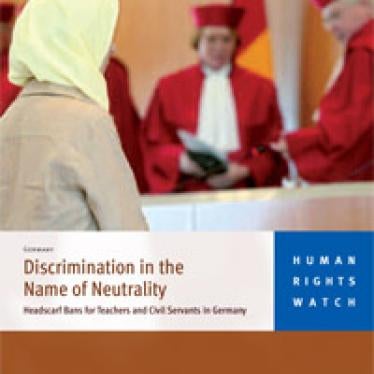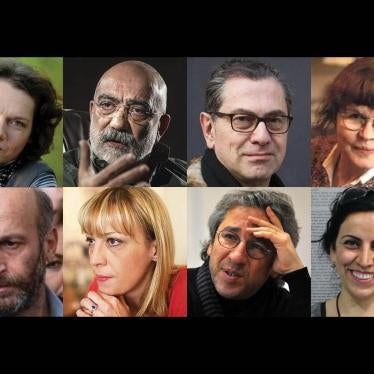The vote on Sunday amending Switzerland’s constitution to ban minaret construction is a sad reflection of growing intolerance toward Muslims in Western Europe.
As the Swiss People Party’s successful referendum campaign against minarets shows, far-right parties, emboldened by a strong showing in June’s European Parliament elections, have become adept at channeling anxieties about demographic change and international terrorism on two emotive issues: building mosques and wearing the Muslim veil. The campaign poster for the yes vote in Switzerland summed it up crudely: minarets launching like missiles off the Swiss flag behind a woman wearing the niqab (a full-face veil leaving only the eyes visible).
Plans to build mosques in Europe’s cities have often provoked significant protest, sometimes involving acts of grotesque vandalism, involving pigs, for instance, which are considered unclean by many Muslims. In March, a pig’s head without eyes was placed on the fence of the mosque in Prague's Kyje district with a sign that said “Stop Islam.” Spikes topped with pigs’ heads were planted on the site of a planned mosque in Austria on New Year’s Eve 2007. A town councilor for the Northern League in the Italian city of Padua strolled a pig on the grounds of a new mosque in 2008.
Some city governments have embraced the construction of official mosques, but there are countless examples of municipalities across Europe stalling or blocking requests from Muslim communities to approve mosque construction.
Denying religious groups places to worship violates their right to freedom of religion. In October, the UN Human Rights Committee warned Switzerland that a ban on minarets would violate the International Covenant on Civil and Political Rights; and the UN expert on religious freedom, Asma Jahangir, has condemned the ban, saying it clearly violates the fundamental right to manifest one’s religion.
Conflicts over mosques also do a deep disservice to the important goals of combating discrimination and encouraging integration of Europe’s newer communities. While in some cases there may be legitimate local dynamics and regulations to consider, the most vocal opponents often cast the issue in terms of defending Europe’s Christian heritage or preventing Islamic radicalism. By presenting Islam as a dangerous interloper, these arguments stigmatize Muslims and feed into routine discrimination.
A major survey commissioned by the European Union’s Fundamental Rights Agency in 14 European countries found that one in three Muslims had experienced some kind of discrimination over the past twelve months. One in ten said they had suffered a racially motivated assault, threat or serious harassment at least once during that time. The vast majority never reported the incidents, lacking confidence that they would get help.
As with the mosque issue, national and local policies in France, Germany, and Belgium banning or restricting the veil send a damaging signal that Muslims are not welcome and undermine the confidence of Muslim communities in equal treatment.
In a recent speech on French national identity, President Nicolas Sarkozy reiterated that what he calls the burqa is not welcome in France. A parliamentary committee has been holding hearings since June to identify policy and legislative responses to a perceived increase in women wearing the full-face veils, and a law to ban the practice in all public places is being considered.
More limited bans already have a devastating effect on Muslim women’s rights in Germany. Laws in eight states prohibit teachers and other civil servants from wearing the headscarf at work, forcing women to choose between their religious belief and their profession. Germany has lost talented teachers as a result.
Supporters of bans tend to rely on three main arguments, the need to protect women’s rights; integrate Muslim migrants; and prevent homegrown terrorism. But general bans are a blunt instrument likely to do more harm than good. They stigmatize and marginalize women who choose to wear the veil and violate their fundamental rights, while doing nothing to help those who wear the veil under coercion.
The Swiss vote has already galvanized far-right parties across Europe. The Danish People’s Party, Vlaams Belang in Belgium, Italian Northern League, and the Dutch Party for Freedom immediately praised the vote and pledged to pursue similar initiatives in their own countries. The debate on the Muslim veil in France is being watched by lawmakers around Europe, including in Italy, where two different draft bills have been tabled that would ban full-face veils throughout the country.
National debates about religious and cultural pluralism will continue in European societies struggling with fears about terrorism and integration. Yet a genuine strategy to prevent violent radicalization and promote integration has to be based on giving immigrants and their descendants a real stake in their European home, encouraging participation rather than exclusion. And that means respect for the fundamental rights to freedom from discrimination and freedom of religion.
..
Judith Sunderland is senior researcher on Western Europe at Human Rights Watch.








